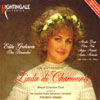Donizetti Linda di Chamounix
View record and artist detailsRecord and Artist Details
Composer or Director: Gaetano Donizetti
Genre:
Opera
Label: Nightingale Classics
Magazine Review Date: 9/1994
Media Format: CD or Download
Media Runtime: 168
Mastering:
Stereo
DDD
Catalogue Number: NC070561-2

Tracks:
| Composition | Artist Credit |
|---|---|
| Linda di Chamounix |
Gaetano Donizetti, Composer
Anders Melander, Marquis de Boisfleury Don Bernardini, Carlo, Tenor Edita Gruberová, Linda, Soprano Estefano Palatchi, Prefect, Bass Ettore Kim, Antonio, Baritone Friedrich Haider, Conductor Gaetano Donizetti, Composer Klas Hedlund, Intendant, Tenor Mikaeli Chamber Choir Monica Groop, Pierotto, Soprano Swedish Radio Symphony Orchestra Ulrika Precht, Maddalena, Soprano |
Composer or Director: Gaetano Donizetti
Genre:
Opera
Label: Philips
Magazine Review Date: 9/1994
Media Format: CD or Download
Media Runtime: 155
Mastering:
Mono
ADD
Catalogue Number: 442 093-2PM2

Tracks:
| Composition | Artist Credit |
|---|---|
| Linda di Chamounix |
Gaetano Donizetti, Composer
Antonietta Stella, Linda, Soprano Cesare Valletti, Carlo, Tenor Fedora Barbieri, Pierotto, Soprano Gaetano Donizetti, Composer Giuseppe Modesti, Prefect, Tenor Giuseppe Taddei, Antonio, Baritone Naples San Carlo Opera Chorus Naples San Carlo Opera Orchestra Piero de Palma, Intendant, Tenor Renato Capecchi, Marquis de Boisfleury, Baritone Rina Corsi, Maddalena, Mezzo soprano Tullio Serafin, Conductor |
Author:
In its own time, the Philips set did indeed afford something of a revelation concerning the opera itself. In 1960 few opera-goers in this country had seen Linda di Chamounix. To Philip Hope-Wallace and Desmond Shawe-Taylor, Gramophone's experienced reviewers in those years, it was new apart from the famous aria ''O luce di quest' anima'' and a couple of excerpts recorded long ago by Battistini. Both of these writers were agreeably surprised: ''consistently elegant and beguiling'' was PH-W's description, and DS-T concluded that his previous notion ''that it was a somewhat empty piece... turns out to be completely wrong''. At a later date I was still of their former opinion myself, having seen a poor production at La Scala in (I think) the early 1970s. It seemed then a thin, insipid entertainment, not helped by the fact that ''O luce di quest' anima'' comes early in Act 1 and is unmatched in tunefulness by anything that follows. At times, the feeling recurs during the course of listening to these recordings: it is partly the familiar want of harmonic exploration and the relapse into a facile prettiness. But there is much more than that. The opera has its distinctive identity, and each of the numbers has its own strength: familiarity breeds respect.
That is why the extra amount spent on a good recording will prove worthwhile. The difference is clear from the start. The Swedish orchestra brings a refinement to the Overture, which does justice to its origins in chamber music (Donizetti adapted one of his string quartets when he found that in Vienna, where the opera had its premiere, they expected more than a brief prelude). Then the chorus enter, raggedly and with uncertain intonation in the San Carlo ranks, admirably precise, well-balanced and sensitive in Stockholm. In both performances, the supporting soloists have their merits, but this is one of those operas named after its heroine, and she is crucial to its success. In the Philips recording Antonietta Stella is simply and seriously miscast: she has not the shine, the vivacity, the technical ease, for the part. Of Gruberova it may be true that her voice would have been still more apt a few years earlier, but she gives a magnificent performance. The tone still has an almost Tetrazzini-like radiance for her introductory aria, and her triumph is also in the creation, through purely vocal means, of a real character. It is an extremely demanding role—in Act 2 she is never off-stage, as one solo or duet follows another, culminating with a Mad scene at the end of which the audience will be disappointed if there is no crowning high E flat. This is a live concert performance recorded here, and Gruberova impresses with her stamina, as she does with her vocal skill and dramatic vividness.
In the Philips set, there are stalwart performances by some of the leading Italian singers of the time, and it is particularly good to hear Barbieri again, her strong Italianate lower register rather more appropriate to the 'trousers' role than Monica Groop's more maternal mezzo. The new version has less resounding names, but all do well, the tenor, Don Bernardini, having sufficient grace and elegance to reconcile us at least partially to the loss of Cesare Valletti. The extra 13 minutes allows some cuts to be restored, most valuably a passage in Act 3 where the Savoyards return home and count their gains. The Philips booklet has a useful essay by Julian Budden, the Nightingale a mildly amusing English translation, and 40 pages in densely printed Japanese.'
Discover the world's largest classical music catalogue with Presto Music.

Gramophone Digital Club
- Digital Edition
- Digital Archive
- Reviews Database
- Full website access
From £8.75 / month
Subscribe
Gramophone Full Club
- Print Edition
- Digital Edition
- Digital Archive
- Reviews Database
- Full website access
From £11.00 / month
Subscribe
If you are a library, university or other organisation that would be interested in an institutional subscription to Gramophone please click here for further information.





